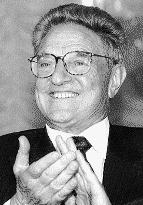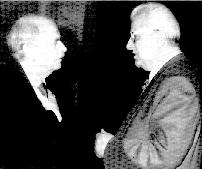
 |
|
He [Soros] is portrayed as someone ... who can be offended if a leader of a
country where he is involved philanthropically is insufficiently
subservient; who will consort with an autocratic regime in order to see his
programs carried out; and who is intent on imposing his influence generally
on an ever-expanding area of the world.
Connie Bruck, The World According to Soros, The New Yorker, 23-Jan-1995, p. 57. |
|
He [Soros] confirmed what someone had told me � that his family name had
long ago been changed from Schwartz.
Connie Bruck, The World According to Soros, The New Yorker, 23-Jan-1995, p. 58. |
|
Of all the countries where Soros has placed his philanthropic bets since
the fall of the Berlin Wall, Ukraine seems on the verge of producing the
greatest payoff. There, more than anywhere else, Soros has been able to
exert influence at the highest levels of the government to see his ideas
implemented. Indeed, if President Leonid Kuchma succeeds in bringing about
the economic reforms he has recently promised, that over-all scenario will
have been scripted, to a notable degree, by Soros. It began back in the fall of 1991, when Ukraine declared its independence, and Soros had what he calls a "seminal meeting" with Dr. Bohdan Hawrylyshyn, and internationally known Ukrainian economist, who, after living abroad for many years, had decided to return to Ukraine in 1988, to help steer its course, and in 1990 had become chairman of the new Soros foundation there. Connie Bruck, The World According to Soros, The New Yorker, 23-Jan-1995, p. 67. |
|
Bohdan Krawchenko, a Ukrainian-Canadian historian ... returned to Ukraine
in 1991 and was recruited by Hawrylyshyn and Soros to work for the
foundation....
Connie Bruck, The World According to Soros, The New Yorker, 23-Jan-1995, p. 68. |
|
Contrasting the Soros foundation in Ukraine with its counterparts in other
countries, Krawchenko told me, "There is no other place where the Soros
foundation is so plugged in at the top. We were here when there was
nothing.... The deputy minister of finance sat with George and me in a
basement almost four years ago and we tried to figure out what to do about
monetary reform." That deputy minister of finance, Olech Havrylyshyn (a
nephew of Bohdan), was on the payroll of the Soros foundation � as was the
deputy governor of the National Bank (George Yurchyshyn, a
Ukrainian-American who had previously been a vice-president at the Bank of
Boston). Despite the fact that Soros had placed his own agents in key positions, he was still not able to move Ukraine according to his own design. Connie Bruck, The World According to Soros, The New Yorker, 23-Jan-1995, p. 68. |
|
Last May [1994], Leonid Kuchma came to the United States and paid Soros a
visit. He was at that time a candidate for President. Soros was so
excited by his conversation with Kuchma that he called Hawrylyshyn, in
Bucharest, and put Kuchma on the phone to relay the outcome of their
meeting. Kuchma was rated an outsider in a large field of candidates, but
in early July he won an upset victory. Soros says that he had nothing to
do with it. However, Evelyn Herfkens, of the World Bank, says, "The Bank
cannot support election campaigns of reformers; in the Ukraine, Soros did."
There was, at the least, a massive effort to level the playing field: the
April, 1994, bulletin of the Soros foundation lists twelve grants, in the
areas of civil society, education, economics, and mass media, eleven of
them for amounts ranging from five thousand dollars to thirty-one thousand
eight hundred dollars, with most in the lower range. But the twelfth � to
support independent television stations' coverage of the Ukrainian
elections � was for $363,100, an extraordinary infusion of capital in
Ukraine, and one that would be spent in a three month period.
Connie Bruck, The World According to Soros, The New Yorker, 23-Jan-1995, p. 68. |
|
That he, a foreigner, has been able to stride so purposefully across the
political landscape of this country [Ukraine] is probably due to a number
of factors, among them his having arrived so early in its independence, and
stayed; his partnership with Hawrylyshyn, who is widely admired, and
trusted for his patriotism.... Still, it was not until his man became
President that Soros was able to begin effectively mobilizing for the kind
of change that he and others in the West had long envisioned. ... But
Kuchma respects Soros, and Kuchma needs to be convinced by memos prepared
by Soros." Soros makes no bones about the interventionist nature of his role in Ukraine. At one point, he remarked, jocularly, "If this isn't meddling in the affairs of a foreign nation, I don't know what is!" ... Soros commented, "I look at Ukraine with the same frame of mind as I look at REITs.... By my intervention, I make it happen!" Connie Bruck, The World According to Soros, The New Yorker, 23-Jan-1995, p. 70. |
|
That he has installed his own paid representatives in the government of
Ukraine � and, in the words of a longtime associate, believes that you "buy"
governments to get things done � might also, conceivably, be viewed as a
minor indiscretion of an idiosyncratic but beneficent individual.
Connie Bruck, The World According to Soros, The New Yorker, 23-Jan-1995, p. 73. |
|
As for the political role that Soros has created for himself in countries
like Ukraine, de Botton continued, "There is such a vacuum, isn't there?
And in a time of crisis someone can emerge. As when a family is in crisis,
and suddenly the chauffeur takes charge!"
Connie Bruck, The World According to Soros, The New Yorker, 23-Jan-1995, p. 75. |
|
Certainly in a country like Ukraine, his foundation is engaging in plainly
political activities, although a reading of the foundation's annual
report � which lists, as its major areas of support, education and research;
civil-society programs; and culture, environment, and health � gives no such
suggestion.
Connie Bruck, The World According to Soros, The New Yorker, 23-Jan-1995, p. 76. |
|
Some of Soros's offshore foundations therefore � such as the one in
Ukraine � are constituted as legally non-controlled entities, each with its
own board of directors. But the idea that it is these local boards which
have control � and not Soros � is as much a chimera as any notion that the
Quantum board has control. Doubtless, the foundation boards have made
decisions; but, as many people within the organization told me, there was
no decision that Soros could not overturn, and in many instances the
decisions emanated solely from him. Soros himself had told me, "I made all
the decisions."
Connie Bruck, The World According to Soros, The New Yorker, 23-Jan-1995, p. 76. |
|
"So I asked for recommendations [for people to staff his Moscow foundation,
says Soros], and I invited people, took them on a trip, and it turned out
that they were all too old and too Jewish!" He chuckled. "And not
acceptable. I mean, you can't be that Jewish in Russia. So I told them,
'You can't have more than one-third Jews on board.'"
Connie Bruck, The World According to Soros, The New Yorker, 23-Jan-1995, p. 77. |
|
The next morning before breakfast, Mr. Soros came to see me at my hotel. He said that if what I had described the previous evening was possible, I could have a few million dollars to try and help firm up the democratic processes in Ukraine. The funds would be forthcoming from the Karl Popper Foundation in Switzerland, financed by a relative of Mr. Soros. Upon my return to Geneva, I wrote a concept paper, a plan, prepared a budget and discussed it with the board of the Karl Popper Foundation. It was approved without any changes. I set up an office in Geneva to manage the Karl Popper Program for Ukraine. Bohdan Hawrylyshyn, Ten years of work on behalf of Ukraine: notable highlights, Part II, A Washington dinner, The Ukrainian Weekly, 28-Feb-1999, pp. 10-11, p. 10. /td> |
|
Leonid Kravchuk, then chairman of the Verkhovna Rada, attended the World Economic Forum in Davos in January 1991. [...] After attending the symposium, Mr. Kravchuk came to our home in Geneva for dinner. After dinner he took me aside and asked if I would become his advisor. I reflected for a minute and told him that I did not think this was a good idea. He asked if this was because I did not want to be an advisor to a Communist, if I was afraid of what people would say about that. I replied that it might be more awkward for him vis-à-vis the Central Committee of the Communist Party to have a person known as a Ukrainian patriot as his advisor. Instead I suggested to create a group of advisors, to be called the Council of Advisors, consisting of well-known personalities from different countries, who would advise the Presidium of the Parliament, in which different political currents were represented, rather than just the chairman. Mr. Kravchuk immediately agreed. Bohdan Hawrylyshyn, Ten years of work on behalf of Ukraine: notable highlights, Part II, A Washington dinner, The Ukrainian Weekly, 28-Feb-1999, pp. 10-11, p. 10 |
 |